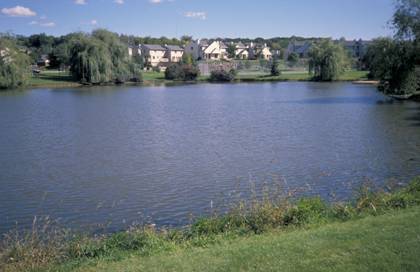Storm water runoff regulation
LEARN MORE ABOUT STORM WATER RUNOFF
Congress amended the federal Clean Water Act in 1987 to control storm water pollution. In 1990, federal regulations required owners of storm water pollution sources, including many industries, municipalities and construction sites, to have National Pollutant Discharge Elimination System (NPDES) Stormwater Permits. The permits require permit-holders to create plans and install management practices that eliminate or reduce storm water pollution.
To meet the requirements of the federal Clean Water Act, DNR developed the Wisconsin Pollutant Discharge Elimination System (WPDES) Storm Water Discharge Permit Program which is administered under the authority of ch. NR 216, Wis. Adm. Code. The WPDES Storm Water Program regulates the discharge of storm water in Wisconsin from three potential sources:
Regulated storm water discharges are considered point sources, so owners or operators of these sources are required to receive a WPDES permit for their discharge. This permitting mechanism is designed to prevent storm water runoff from washing harmful pollutants into local surface waters such as streams, rivers, lakes or coastal waters.
Management practices are required
Permittees are required to use best management practices (BMPs) to control and prevent pollutants in storm water runoff. A brief overview of requirements for each type of permittee is provided.
Construction sites
The WPDES Construction Site Storm Water Discharge Permit is designed to help decrease the amount of sediment that pollutes Wisconsin's waterways due to new land disturbance. Landowners of most construction projects where one or more acres of land will be disturbed must obtain a WPDES Construction Site Storm Water Discharge Permit. Permittees must develop a Storm Water Management Plan and an Erosion and Sediment Control Plan describing the best management practices that will be used on-site. The plans can be developed using the Storm Water construction and post-construction technical standards provided by the DNR. A construction site Notice of Intent form and applicable fee is submitted to the Department at least 14 working days before construction will begin. Best management practices described in the Storm Water Management Plan and Erosion and Sediment Control Plan to help control erosion and prevent contamination of storm water must be implemented. Weekly on-site inspections through the duration of the project and after storm water events are required.
Industrial sites
Storm water may come into contact with a wide variety of pollutants at industrial facilities such as oil/grease, sediment, PCBs, de-icing salts, sand, pesticides, fertilizers, gasoline, antifreeze and heavy metals such as lead and mercury. Most storm sewers do not connect to a wastewater treatment plant, so untreated runoff carries pollutants directly into lakes, rivers and groundwater.
Photo by Gerry Jarmuz
Chapter NR 216 of the Wis. Adm. Code. contains a list of industrial facilities that must obtain storm water discharge permit coverage. The determination of whether an industrial facility must obtain storm water discharge permit coverage is based both on the facility's Standard Industrial Classification (SIC) code and whether or not the facility has the potential to contaminate storm water.
Permitted facilities must develop a site-specific Storm Water Pollution Prevention Plan (SWPPP). The goal of this plan is to encourage source-area control through identification of a storm water pollution prevention individual, site-specific best management practices, and implementation schedules to help decrease the amount of contaminated storm water runoff from a facility. Some industrial facilities may also be required to conduct annual chemical monitoring for pollutants in runoff from their sites.
Municipal separate storm sewer systems (MS4s)
The MS4 permits require that municipalities develop a storm water management program that includes information and education of the public, illicit discharge detection and elimination, creation and enforcement of local ordinances to regulate erosion control and long-term storm water management, and implementation of pollution prevention at municipally owned facilities. MS4 permits require implementation of best management practices for source-area control instead of numerical effluent limits.
In Wisconsin, MS4 permittees are also required to implement a reduction in total suspended solids (TSS) in runoff that enters waters of the state as compared to no controls. A municipality is required under s. NR 216.07(6)(b), Wis. Adm. Code, to provide an assessment of the actions taken to comply with the TSS performance standards. The initial assessment must include a pollutant-loading analysis using a model such as SLAMM, P8, or equivalent methodology that is approved by the DNR.
storm water runoff.
To control TSS, storm water management control practices such as storm water infiltration basins, wet ponds, bioretention, and other practices may need to be constructed. The DNR has provided technical standards to assist the MS4 in design of BMPs.
Sediment removal from wet and dry detention ponds and infiltration basins may be subject to the requirements of ch. NR 528, Accumulated Sediment from Storm Water Management Ponds. See Managing accumulated sediment from storm water ponds.
Financial assistance is available to MS4s through both the Urban nonpoint source and storm water grants and the DNR Bureau of Community Financial Assistance.
Storm water management performance standards
Storm water permittees may also be subject to the performance standards of Ch. NR 151, Wis. Adm. Code. This rule contains the non-agricultural performance standards, transportation facility performance standards and a process for the development and dissemination of non-agricultural technical standards.
Technical standards
DNR has provided technical standards to assist in the design and installation of Best Management Practices (BMPs).
Voluntary storm water management activities
Beyond regulatory storm water management, the DNR also supports a wide variety of voluntary storm water management activities. These include projects funded through the Urban nonpoint source and storm water and Targeted runoff management grant programs.
The University of Wisconsin Learning Store have additional information available about storm water management from the scale of a residential rain garden through construction site erosion control plans for multi-acre construction sites.


